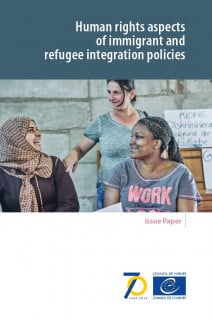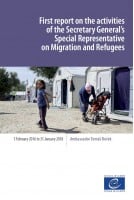“Integration policies should not pursue migration-control goals but facilitate the enjoyment of human rights and fundamental freedoms of migrants and refugees." Tomáš Bocek, Special Representative of the Secretary General on migration and refugees
This Issue Paper examines integration policies regarding immigrants and refugees in selected Council of Europe member states in light of human rights standards. In particular, it focuses on how the enjoyment of the right to respect for private and family life and the security of residence of immigrants and refugees facilitate and improve integration policies. It covers the adverse effects that mandatory language and civic integration policies and some other conditions such as income thresholds, housing requirements and reduced financial benefits might have on the socio-economic inclusion of immigrants and refugees. While taking stock of integration policies in some of the European countries which experienced unprecedented massive arrivals of migrants and refugees in the last five years the Issue Paper offers a comparative basis for identifying good integration practices.
CONTENTS
EXECUTIVE SUMMARY
INTRODUCTION
COUNCIL OF EUROPE STANDARDS
2.1. The European Convention on Human Rights and the European Court of Human Rights case law
2.2. The European Social Charter
2.3. Other Council of Europe standards and recommendations
EUROPEAN UNION STANDARDS
3.1. Integration requirements in EU migration law
3.2. Principles applicable to integration requirements under EU law
INTEGRATION POLICIES IN SELECTED COUNCIL OF EUROPE MEMBER STATES
4.1. Requirements regarding family reunification
4.2. Requirements for access to long-term or permanent residence
4.3. Human rights implications and promising practices
CONCLUSIONS
METHODOLOGY
ACKNOWLEDGEMENTS





